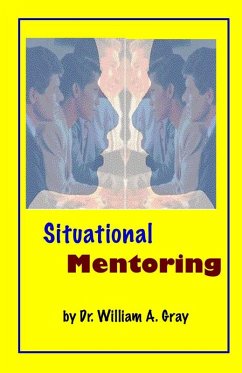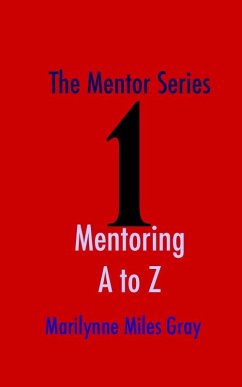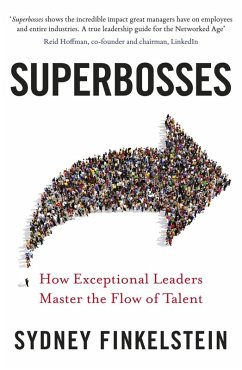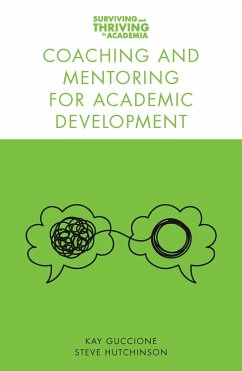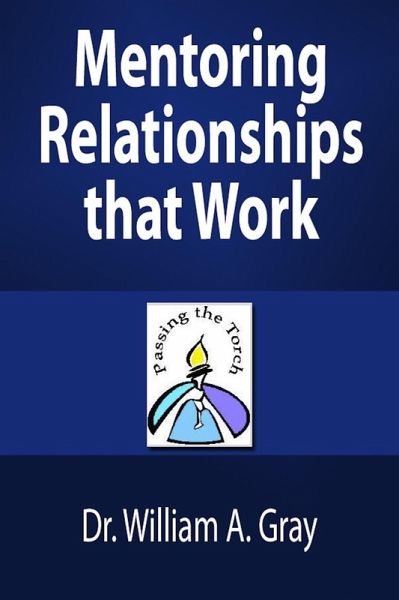
Mentoring Relationships that Work (eBook, ePUB)

PAYBACK Punkte
2 °P sammeln!
FOREWORDWhy should you read this ebook when there are over 300 other books already written on mentoring? This book is based on my designing over 150 different Mentoring Programs for different kinds of participants and different purposes - and training over 20,000 mentor-protege partners to Mentor with the Right Style by employing Situational Mentoring. This produces benefits for the protege, the mentor, and their organization. I've trained over 300 Mentoring Program Coordinators to oversee everything. Why should mentors read this book? Mentors will learn how to improve your effectiveness - by ...
FOREWORD
Why should you read this ebook when there are over 300 other books already written on mentoring?
This book is based on my designing over 150 different Mentoring Programs for different kinds of participants and different purposes - and training over 20,000 mentor-protege partners to Mentor with the Right Style by employing Situational Mentoring. This produces benefits for the protege, the mentor, and their organization. I've trained over 300 Mentoring Program Coordinators to oversee everything.
Why should mentors read this book? Mentors will learn how to improve your effectiveness - by creating a better mentor-protege relationship, by interacting with proteges in new ways to equip and empower them, by helping proteges achieve desired goals. What you learn abut Situational Mentoring(TM) will save you valuable time (lack of time seems to be everyone's main problem these days).
Why should proteges (mentees) read this book? Proteges will learn how to manage the mentoring process - by requesting the mentor assistance you need - to help you handle especially challenging situations. In Chapter 6, I describe how I did this to make the transition from salaried professor to businessman who generates his own income. Proteges will also learn how to provide effective and efficient mentoring for others.
You noticed that I use the Anglicized word "protege" (meaning the "protected one"). I do this for four reasons: (1) "Protege" is of French origin, where "le protégé" (male) and "la protégée" (female) are used to indicate gender. (2) It is awkward using these two French versions when writing in English. (3) "Protege" has been used longer than "mentee" or "mentoree" or any other word, to designate the recipient of mentoring. (4) Beginning in 1984, I copyrighted over 20 customized mentoring products in which I use the word "protege" (e.g., Protege Needs Inventory, Mentoring Style Indicator, Mentoring Action Plan, Mentoring Compatibility Indicator).
Even if you use another word for protege, like some of my clients do, you will still learn helpful concepts and skills by reading this book.
In another book - Mentoring Relationships that Produce Results - I describe more than 30 very different, formalized Mentoring Programs I have helped organizations to develop. I explain why a Mentoring Program Development Expert (who has at least 10 years of dedicated experience and practical know-how) is needed to define, design and deliver all of the essential components that each distinctive Program requires in order to produce multiple benefits for proteges, mentors and their organization. And, I contrast informal and formalized mentoring.
Why should you read this ebook when there are over 300 other books already written on mentoring?
This book is based on my designing over 150 different Mentoring Programs for different kinds of participants and different purposes - and training over 20,000 mentor-protege partners to Mentor with the Right Style by employing Situational Mentoring. This produces benefits for the protege, the mentor, and their organization. I've trained over 300 Mentoring Program Coordinators to oversee everything.
Why should mentors read this book? Mentors will learn how to improve your effectiveness - by creating a better mentor-protege relationship, by interacting with proteges in new ways to equip and empower them, by helping proteges achieve desired goals. What you learn abut Situational Mentoring(TM) will save you valuable time (lack of time seems to be everyone's main problem these days).
Why should proteges (mentees) read this book? Proteges will learn how to manage the mentoring process - by requesting the mentor assistance you need - to help you handle especially challenging situations. In Chapter 6, I describe how I did this to make the transition from salaried professor to businessman who generates his own income. Proteges will also learn how to provide effective and efficient mentoring for others.
You noticed that I use the Anglicized word "protege" (meaning the "protected one"). I do this for four reasons: (1) "Protege" is of French origin, where "le protégé" (male) and "la protégée" (female) are used to indicate gender. (2) It is awkward using these two French versions when writing in English. (3) "Protege" has been used longer than "mentee" or "mentoree" or any other word, to designate the recipient of mentoring. (4) Beginning in 1984, I copyrighted over 20 customized mentoring products in which I use the word "protege" (e.g., Protege Needs Inventory, Mentoring Style Indicator, Mentoring Action Plan, Mentoring Compatibility Indicator).
Even if you use another word for protege, like some of my clients do, you will still learn helpful concepts and skills by reading this book.
In another book - Mentoring Relationships that Produce Results - I describe more than 30 very different, formalized Mentoring Programs I have helped organizations to develop. I explain why a Mentoring Program Development Expert (who has at least 10 years of dedicated experience and practical know-how) is needed to define, design and deliver all of the essential components that each distinctive Program requires in order to produce multiple benefits for proteges, mentors and their organization. And, I contrast informal and formalized mentoring.
Dieser Download kann aus rechtlichen Gründen nur mit Rechnungsadresse in A, B, BG, CY, CZ, D, DK, EW, E, FIN, F, GR, HR, H, IRL, I, LT, L, LR, M, NL, PL, P, R, S, SLO, SK ausgeliefert werden.





